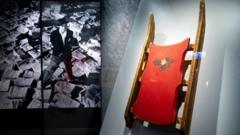In a heated exchange, Prof. Paul Sereno, a palaeontologist linked to Niger, criticized the auction as "brazen," calling for the meteorite's return. His sentiments echo the feelings of the Nigerien authorities, who voiced suspicions about the legitimacy of the meteorite's journey from its discovery location to the auction house. Despite Sotheby’s insistence that all procedures were correctly followed, Niger has initiated an investigation into the sale.
The meteorite, weighing 24.7 kg (54 lbs) and previously exhibited publicly in New York and Italy, was uncovered in Agadez by an undisclosed meteorite hunter. It is among fewer than 400 known meteorites from Mars, highlighting its significance.
While Niger strives to protect its heritage, the nation currently lacks specific laws regarding meteorites, which has added complexity to the case. Prof. Sereno pointed out that international agreements should encompass such extraterrestrial finds to prevent potential exploitation. Meanwhile, the country is moving toward preserving its heritage, including plans for a museum dedicated to showcasing significant artifacts.
As discussions continue over ownership rights, many are left wondering if this could prompt stronger regulations globally regarding the trade of meteorites, particularly as similar issues also persist in neighboring countries like Morocco, known for its rich deposits of meteorites.
With the auction spotlighting the complexities of ownership, there is hope that it will catalyze action from Niger for the return of their cultural treasures and stimulate international discourse on the ethics of meteorite trading.
The meteorite, weighing 24.7 kg (54 lbs) and previously exhibited publicly in New York and Italy, was uncovered in Agadez by an undisclosed meteorite hunter. It is among fewer than 400 known meteorites from Mars, highlighting its significance.
While Niger strives to protect its heritage, the nation currently lacks specific laws regarding meteorites, which has added complexity to the case. Prof. Sereno pointed out that international agreements should encompass such extraterrestrial finds to prevent potential exploitation. Meanwhile, the country is moving toward preserving its heritage, including plans for a museum dedicated to showcasing significant artifacts.
As discussions continue over ownership rights, many are left wondering if this could prompt stronger regulations globally regarding the trade of meteorites, particularly as similar issues also persist in neighboring countries like Morocco, known for its rich deposits of meteorites.
With the auction spotlighting the complexities of ownership, there is hope that it will catalyze action from Niger for the return of their cultural treasures and stimulate international discourse on the ethics of meteorite trading.

















